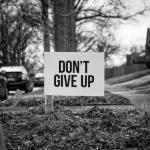As world leaders and climate activists meet in November for the U.N.’s COP27, preachers and congregations can add their voices to the calls for climate justice.
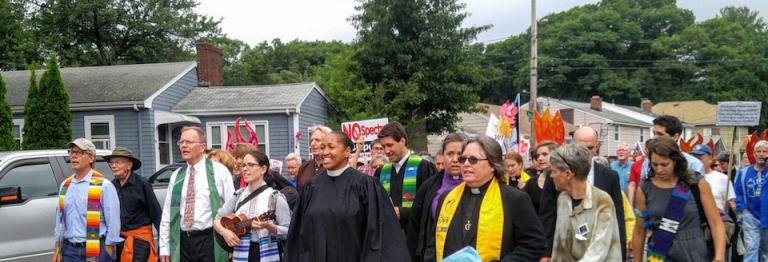
The 27th Conference of the Parties to the United Nations Framework Convention on Climate Change (#COP27), will meet in Egypt from Nov. 6 to 18, 2022. Here are ideas for reading Scripture and preaching during COP27. Malachi 4:1-2 is a prophetic warning and promise, while Luke 21:5-19 recounts an apocalyptic discourse between Jesus and his disciples. These texts are assigned as part of the Revised Common Lectionary for Twenty-third Sunday after Pentecost on Nov. 13. This is part of the EcoPreacher 1-2-3 series to equip preachers and congregations for engaging the Bible through an ecological lens.
Eco-Exegesis
Eco-exegesis is a method of interpreting the biblical text through a green lens using the principles of ecological theology.
Malachi 4:1-2
See, the day is coming, burning like an oven, when all the arrogant and all evildoers will be stubble; the day that comes shall burn them up, says the LORD of hosts, so that it will leave them neither root nor branch. 2But for you who revere my name the sun of righteousness shall rise, with healing in its wings. You shall go out leaping like calves from the stall.
The Book of Malachi is a scathing indictment against religious leaders who forsake their sacred duty to uphold God’s covenant and protect the people in their care. Writing around 420 B.C.E., the prophet condemns the priests who collude with polluting, cheating, and disrespectful leaders. But he commends those who practice reverence, display integrity, and lead with justice and righteousness. The former will be held accountable for their failure to stand up for what is right, while the latter will experience healing and joy.
This ancient text has implications for faith leaders and congregations today in the context of the global climate crisis.
Will we raise our voices in solidarity with those who are suffering from climate-fueled catastrophic storms, droughts, wildfires, sea-level rise, and agricultural collapse? Or will we remain silent, implicitly condoning the ecocide happening all around us? In Chapter 2, verse 10, the prophet pleads for his community to join together in faith, despite their differences: “Have we not all one father? Has not one God created us? Why then are we faithless to one another, profaning the covenant of our ancestors?”
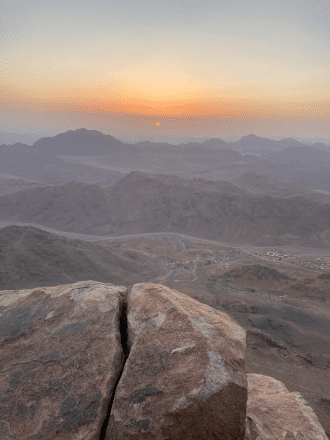
On Sunday, November 13, 2022, faith leaders have an opportunity to stand together in calling for the deep changes in attitude and heart that are required for climate justice. To support, challenge, and inspire discussions during COP27, a weekend event entitled “Returning to Mt. Sinai — A Prophetic Call for Climate Justice and Ceremony of Repentance” will be held at Sharm El Sheikh. This event will be heart-stirring, transformative, and a moment of inspiration for religious communities as well as for humanity. Never before has such an interreligious Climate Repentance Ceremony been undertaken. Motivation for action will emerge, calling for reexamination of deep-seated attitudes and for identifying ways to transform these attitudes for the wellbeing of Earth, our common home. To learn more about this event and how you can stand with these faith leaders while in your own place of worship, visit: https://interfaithsustain.com/returning-to-mt-sinai/
Luke 21:19
“By your endurance you will gain your souls.”
In Apocalypse When? A Guide to Interpreting and Preaching Apocalyptic Texts that I cowrote with Jerry L. Sumney, he explains that Luke is writing to a church who has already experienced the fall of the temple in Jerusalem after the siege of Rome. Though they were a primarily Gentile congregation, the destruction of the Jewish temple was devastating for them as well, because it called into question the goodness and power of God. We might have similar theological angst in the face of planetary ecological collapse.
As we deal with unprecedented environmental and social upheavals, we, too, might question whether God cares and what God is doing, if anything.
However, Sumney say, “believers are to look up in hope and expectation; their salvation is arriving. The announcement of coming judgment is a threat to some because justice will be meted out. But it is a blessing to others, and for the same reason” (79).
This is not to say that the path of faith is easy. Jesus is clear that those who stand up for justice and righteousness are often persecuted and abused. Faith leaders who have stood against the fossil fuel industry and the U.S. government at Standing Rock Reservation and other public protests, for example, can attest to the travail of being arrested, gassed, tazed, bludgeoned, water-hosed, and assaulted with rubber bullets. Not to mention the vitriol from online trolls, bots, and even relatives and former friends. (Visit https://www.clergyclimateaction.org/ to learn more about clergy coming together to take climate action.)
Ultimately, however, Jesus’s apocalyptic discourse assures us that there is a power that is greater, longer-lasting, and more effective than violence against Creation and people. It is the power of truth, honesty, discernment, advocating for and protecting the vulnerable, resisting authoritarian oppression, and casting a vision for the Realm of God. This is what Jesus tells us standing beneath the towering temple. This is what Jesus’s ministry, life, death, and resurrection were about. And this is what God wants the church to be about. “By your endurance you will gain your souls” (Luke 21:19).
1 Eco-Idea
The Eco-Idea is one succinct statement that tells us who God is and/or what God does in relation to Creation and how we should respond as people of faith.
As we face unprecedented upheavals from the climate crisis, God calls us to join in solidarity with our siblings of other faiths to raise our voices for protecting Creation, communities, and those most vulnerable.
2 Eco-Questions
Eco-Questions are what we can ask to help a congregation draw out the implications of the Eco-Exegesis and Eco-Idea.
- Recall a brave step that you took toward fullness of life, or a time when you made a decision to do the right thing, even though it was personally difficult or costly. What led to your willingness to take that step? What changed for you in doing so?
- If your congregation could do just one thing for transforming hearts and minds to take action on the climate, where would you want to focus your energies? Do you feel more strongly called to the level of personal, community, institutional, or political transformation at this time?
3 Eco-Actions
Eco-Actions are ways that a congregation might respond to the Eco-Idea and Eco-Questions. One of these possibilities may have salience for your ministry context.
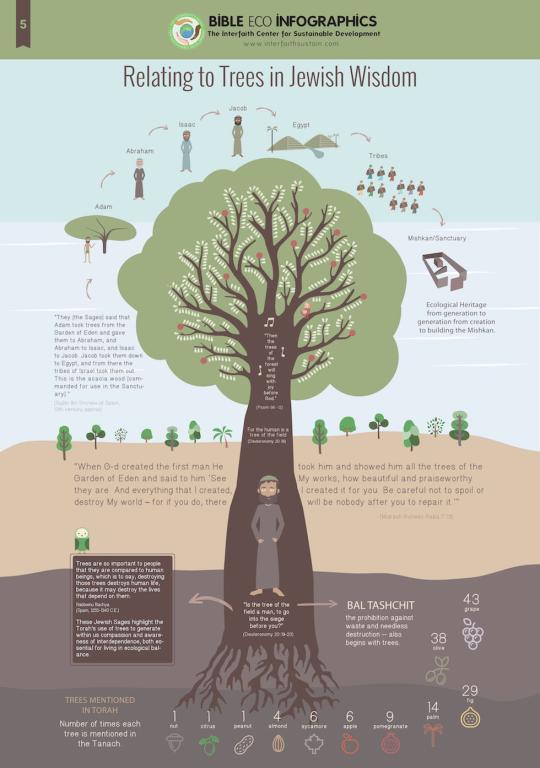
1 – Educate.
The Interfaith Center for Sustainable Development (ICSD) has developed seven infographics on the Bible and ecology. The infographics help viewers visually understand Bible-ecological concepts in relation to biodiversity, animal welfare, food, and trees. Use them in a study or forum for your congregation: https://interfaithsustain.com/bible-eco-infographics/
2 – Advocate.
Write a letter to the editor or an opinion editorial for your local newspaper. Or post on your social media network about why climate justice is important to you as a person of faith. Explain why Scripture’s call to care for God’s Creation and the most vulnerable peoples compels you to raise your voice in support of greenhouse gas mitigation, climate preparedness, and accountability for fossil fuel companies. Visit Creation Justice Ministries for more advocacy ideas: https://www.creationjustice.org/action.html
3 – Activate.
EcoAmerica’s Blessed Tomorrow offers a Climate Ambassador training. The free, four-hour, on-demand, online training and resources will empower and equip you to inspire clergy, congregants, your workplace, community, and policymakers to action on climate change that makes a difference. Click here: https://blessedtomorrow.org/blessed-tomorrow-ambassadors-training/.
Read also:
Choose Life for Earth, Choose Earth for Life: Deuteronomy 30:15-20
A Blessed Ecosystem of Faith: Psalm 1, Jeremiah 17:5-10, Luke 6:17-26
Clergy Report Preaching More about Climate Change: National Survey
10 Principles for Environmental Preaching: How to Craft Eco-Sermons
Sign up for monthly installments of EcoPreacher 1-2-3!
EcoPreacher 1-2-3 is a partnership between the Rev. Dr. Leah Schade and the Interfaith Center for Sustainable Development, publishers of Eco Bible, a Jewish ecological commentary on the Hebrew Scriptures. EcoPreacher 1-2-3 provides Creation-centered sermon preparation that is short, accessible, and based on a solid biblical foundation. To see other EcoPreacher ideas and to sign up to receive future EcoPreacher 1-2-3 installments, click here.
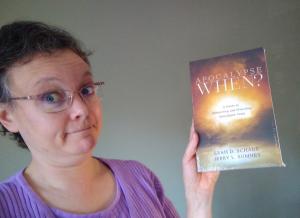
The Rev. Dr. Leah D. Schade is the Associate Professor of Preaching and Worship at Lexington Theological Seminary in Kentucky and ordained in the ELCA. Dr. Schade does not speak for LTS or the ELCA; her opinions are her own. She is the author of Preaching in the Purple Zone: Ministry in the Red-Blue Divide (Rowman & Littlefield, 2019) and Creation-Crisis Preaching: Ecology, Theology, and the Pulpit (Chalice Press, 2015). She is the co-editor of Rooted and Rising: Voices of Courage in a Time of Climate Crisis (Rowman & Littlefield, 2019). Her latest book, co-written with Jerry Sumney is Apocalypse When?: A Guide to Interpreting and Preaching Apocalyptic Texts (Wipf & Stock, 2020).


